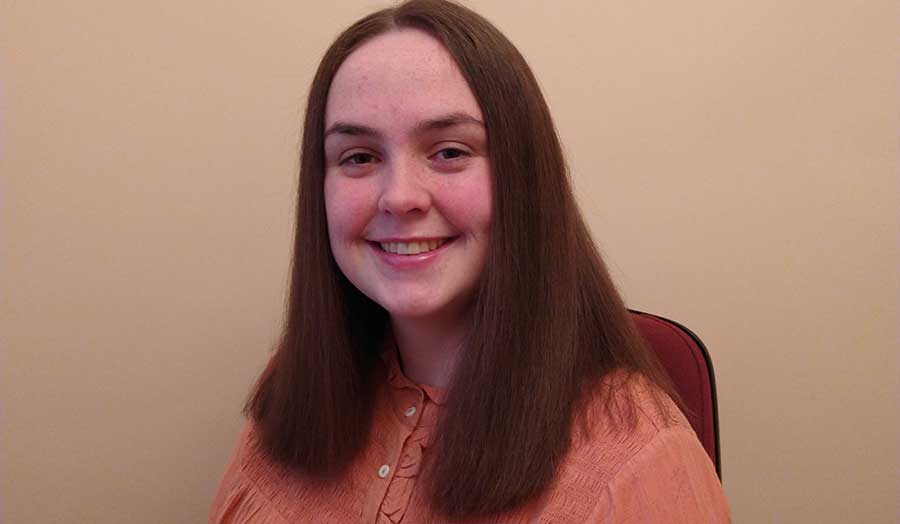Laura is a Sport and Exercise Science BSc grad who recently returned to London Met to work as an academic mentor. Here she reflects on the highlights of her time as a student, from discovering breath-by-breath gas analysis, to securing unforgettable work experience at the 2017 World Athletic Championships.
Hi Laura, your relationship with London Met went from studying with us to joining our academic teaching team. How did it all begin?
I’ve always enjoyed sport, dabbling in rugby, swimming and football as you do when you are younger, eventually settling on football. It was always an important part of my life and therefore my choices in education incorporated this – at GCSE and then A level I picked PE. I realised that not only did I enjoy sport as a recreational activity, but I also enjoyed studying it and, what’s more, that I was actually quite good at it! So when it came to applying for universities during sixth form I knew my future had to be sport-related.
As soon as I saw the course title Sport and Exercise Science on UCAS, I knew that was the course for me. It incorporates biomechanics, physiology and psychology. The next decision was where to study. I took the advice given at my college careers events and booked open days and I’m glad I did. Open days and applicant days give you a feel for the university in addition to allowing you to meet some of your lecturers. As soon as I finished my open day at London Metropolitan University, I knew it was the place for me. I felt like I belonged.
That’s so great to hear. Could you tell us about a highlight of your course?
My favourite project was a module in third year where we could undertake a research topic different to our dissertation. It was very practical-based, so we were in the physiology labs nearly every week, and, unlike the dissertation, worked in groups on the project. My group decided to compare the energy expenditure and heart rate values from the Fitbit Surge with breath-by-breath gas analysis and a Polar heart rate strap during cycling to see if they were comparable.
What do you think of the facilities here?
The facilities at London Metropolitan University are excellent. For example, there’s an environmental chamber where you can manipulate temperature and humidity, Cosmed breath-by-breath gas analysers, an isokinetic dynamometer, blood analysers (lactate and glucose), BodPod (body fat analyser), EMG, Wattbikes, treadmills, 2D video analysis, force plates... Additionally, there’s a sports hall, therapy rooms, a sport injury clinic and a gym. Beyond sport-specific facilities, there are large lecture rooms, libraries, cafés and the Rocket (our student bar).
Did you have a favourite piece of equipment?
Either the environmental chamber (just because it’s a great overall experience) or the Cosmed gas analyser as it’s quite intricate, but once you know how to calibrate it and where each tube goes as well as how to fit the face mask and the theory behind it, it’s quite satisfying!
Did you gain any work experience while at London Met?
As a success coach (which is a paid role) at the University I had the opportunity to work alongside senior lecturers in delivering content and practical sessions to first year students. One practical I assisted with was the Douglas bag practical where students would cycle and gradually increase their work rate. During my time at London Met I also had the opportunity to be an athlete chaperone for the anti-doping team for the 2017 IAAF World Athletic Championships. This involved notifying athletes who were selected for testing (urine or blood) and observing them on their way to doping control to ensure nothing untoward happened prior to them providing a sample. I will never forget this experience as it’s very hard to get experience in elite sport.
Was there anything you found surprising about the University?
Personally, I was surprised how student-centred it us and that you could approach lecturers and ask them questions before or after lectures.
Did you feel supported by the lecturers on your course?
Yes, they were more than happy to answer questions and host office hours for meetings. They would also host tutorials on upcoming assessments and provide feedback on draft pieces of my work. The classes weren’t too big so I was able to interact with the staff members and have more in-depth discussions on particular topics.
How did London Met help shape your next steps?
I‘m now working at London Met as an academic mentor in the School of Human Sciences. The University increased my confidence in my own abilities and therefore I felt more than capable of further study and went on to study a master’s in Sport, Health and Exercise Sciences (at Brunel). I enjoyed my time so much at London Met that when a job came up in the department, I jumped at the opportunity to apply and luckily, I got the position!
We’ve really enjoyed hearing about your time here. Before you go, do you have any tips for new students?
Get involved with everything London Met has to offer, the more you get involved with the more people you meet, the more you feel involved and the more you get out of the experience.
Don’t panic! You’re not expected to know everything, the whole point of university is to learn and everyone will have different levels of knowledge when they arrive, attend your lectures and support sessions and go over the material covered after lectures and tutorials. And don’t be afraid to ask for help. All staff members are more than happy to provide support and assistance.

